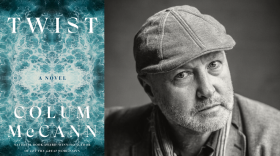This week on The Write Question, host Lauren Korn speaks with Dr. Alan Townsend, author of <i>This Ordinary Stardust: A Scientist’s Path from Grief to Wonder</i> (Grand Central Publishing, Hachette Book Group).
A decade ago, Alan’s family received two catastrophic diagnoses: his 4-year-old daughter and his wife (a scientist) developed un-related, life-threatening forms of brain cancer. As he witnessed his daughter fight her cancer during the courageous final months of her mother’s life, Alan—also a scientist—was irrevocably changed. He began to see scientific inquiry not only as a source of answers to a given problem, but also as a lifeboat and, as is drawn out in this conversation, a source of spirituality and creativity: a lens on the world that could help him find peace with the painful realities he could not change. Through scientific wonder, he found ways to bring meaning to his darkest period.
About Alan:
Dr. Alan Townsend is a scientist, author, speaker, and dean of the University of Montana’s W. A. Franke College of Forestry and Conservation. He is the highly-cited author of more than 140 scientific articles and has served in multiple prominent leadership roles. He was named an Aldo Leopold Leadership Fellow and a Google Science Communication Fellow and was one of six scientists chosen to be in the Let Science Speak documentary film series, which premiered at the Tribeca TV Festival in September of 2018. He lives in Montana with his family and two ridiculous dogs.
Books mentioned in This Ordinary Stardust:
<i>The Control of Nature</i> by John McPhee (Farrar, Straus and Giroux)
<i>The Overstory</i> by Richard Powers (W. W. Norton & Company)
<i>Upstream: Selected Essays</i> by Mary Oliver (Penguin Random House)
<i>The Story of More: How We Got to Climate Change and Where to Go from Here</i> by Hope Jahren (Vintage Books)
<i>Braiding Sweetgrass: Indigenous Wisdom, Scientific Knowledge and the Teachings of Plants</i> by Robin Wall Kimmerer (Milkweed Editions)
<i>Behave: The Biology of Humans at Our Best and Worst</i> by Robert M. Sapolsky (Penguin Random House)
<i>Shoal of Time: A History of the Hawaiian Islands by Gavin Daws</i> (University of Hawaii Press)
<i>I Contain Multitudes: The Microbes Within Us and a Grander View of Life</i> by Ed Yong (Ecco Press)
<i>Underland: A Deep Time Journey</i> by Robert Macfarlane (W. W. Norton & Company)
<i>Endurance: Shackleton’s Incredible Voyage</i> by Alfred Lansing (Basic Books)
<i>The Brain That Changes Itself: Stories of Personal Triumph from the Frontiers of Brain Science</i> by Norman Doidge (Penguin Random House)
<i>My Stroke of Insight: A Brain Scientist’s Personal Journey</i> by Jill Bolte Taylor (Penguin Random House)
<i>The Demon-Haunted World: Science as a Candle in the Dark</i> by Carl Sagan (Ballantine Books)
<i>Horizon</i> by Barry Lopez (Vintage Books)
<i>The Dog Stars</i> by Peter Heller (Vintage Books)
<i>The Solace of Open Spaces</i> by Gretel Ehrlich (Penguin Random House)
Dr. Alan Townsend recommends:
The writing of Chris Dombrowski, author of <i>Body of Water: A Sage, a Seeker, and the World’s Most Alluring Fish</i> and <i>The River You Touch: Making a Life on Moving Water</i> (Milkweed Editions)
Lauren Korn recommends:
<i>This Ordinary Stardust: A Scientist’s Path from Grief to Wonder</i> by Dr. Alan Townsend (Grand Central Publishing, Hachette Book Group)
<i>Braiding Sweetgrass: Indigenous Wisdom, Scientific Knowledge and the Teachings of Plants</i> by Robin Wall Kimmerer (Milkweed Editions)
<i>Body of Water: A Sage, a Seeker, and the World’s Most Alluring Fish</i> and <i>The River You Touch: Making a Life on Moving Water</i> by Chris Dombrowski (Milkweed Editions)
With Every Great Breath: New and Selected Essays, 1995-2023 (Counterpoint Press), Winter: Notes from Montana by Rick Bass (Mariner Books)
Aligning the Glacier’s Ghost: Essays on Solitude and Landscape by Sarah Capdeville (University of New Mexico Press)
We Hold Our Breath: A Journey to Texas Between Storms by Micah Fields (W. W. Norton & Company)
—
The Write Question team for this episode was Lauren Korn, host, co-producer, and editor; and Chris Moyles, co-producer, editor, and sound engineer. This episode is sponsored by Chapter One Bookstore in Hamilton, Montana, a literary and community resource for the Bitterroot Valley—providing space to explore, discover, and share passions since 1974. More information can be found at Chapter1Bookstore.com.
The Write Question logo and brand (2022) was designed by Molly Russell. You can see more of her work at iamthemollruss.com and on Instagram @iamthemollruss. Our music was written and recorded by John Floridis.
Funding for The Write Question comes from Humanities Montana; members of Montana Public Radio; and from the Greater Montana Foundation—encouraging communication on issues, trends, and values of importance to Montanans.
The Write Question is a production of Montana Public Radio.






